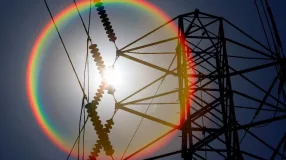
Climate change is among the most critical issues of our time, requiring unprecedented collaboration between stakeholders to develop and implement innovative, sustainable, and practical solutions to address the issue. As companies integral to America’s energy transmission, INGAA members are leading the natural gas industry in climate solutions through commitments to reduce methane emissions and reach net-zero greenhouse gas (GHG) emissions from natural gas transmission and storage by 2050.
To date, the natural gas industry has played a critical role in helping reduce GHG emissions across the value chain. Between 2005 and 2019, total U.S. electricity generation increased by almost 2 percent while related CO2 emissions fell by 33 percent, a reduction made possible by increased use of natural gas. Since 1990, the natural gas industry has reduced methane emissions by 70 million metric tons of CO2e – equivalent to taking nearly 15 million cars off of the road for an entire year. Our members also participate in GHG reduction programs like EPA’s Natural Gas STAR and Methane Challenge Programs and One Future to continue that momentum and further reduce the emissions of our industry.
In addition to emissions reductions, the natural gas industry facilitates the increased use of renewable energy sources. According to research from the National Bureau of Economic Research, the growth of natural gas for power generation correlates to the increased deployment of renewables – ultimately lowering costs for consumers while continuing to reduce GHG emissions and ensure energy reliability.
For example, as the regional grid operator, ISO New England, acknowledges, a lack of pipelines carrying natural gas into the region contributes to less reliability, higher emissions, and higher energy costs, further highlighting the role gas plays in the power mix and that pipelines have in ensuring electric reliability and affordability.
INGAA’s members build upon these industry-wide achievements in emissions reductions and the further adoption of renewable energy by constantly finding new ways to improve natural gas pipeline safety and efficiency. INGAA member TC Energy is advancing the industry towards decarbonization and emissions reductions through its work to gradually convert its compressor fleet to zero-emission electric motor drives on its pipeline systems.
As innovation leaders in the natural gas industry, INGAA members engage in critical partnerships with key stakeholders focused on delivering creative and sustainable climate solutions. For example, as part of INGAA member Equitrans Midstream’s Earth Day celebration this year, the company is kicking off a two-year sustainability partnership with urban beekeeping organization Alvéole. Through this partnership, Equitrans will bring honeybee hives to three of its offices alongside on-site informational sustainability events for employees.
Other INGAA members, like Williams, have used their industry position to invest in and support energy companies innovating technologies for reduced emissions. Williams’ Corporate Venture Capital (CVC) program’s strategic relationship with Aurora Hydrogen – a tech startup developing the technology for converting natural gas to zero-emission hydrogen – demonstrates the value of cross-industry support and collaboration in addressing climate change. These kinds of partnerships are fundamental to the success of a holistic, cross-industry approach to environmental sustainability.
By continuing to innovate and engage in strategic partnerships, the natural gas industry will remain a leader not just in safely providing affordable energy, but in creating climate solutions for the future.






